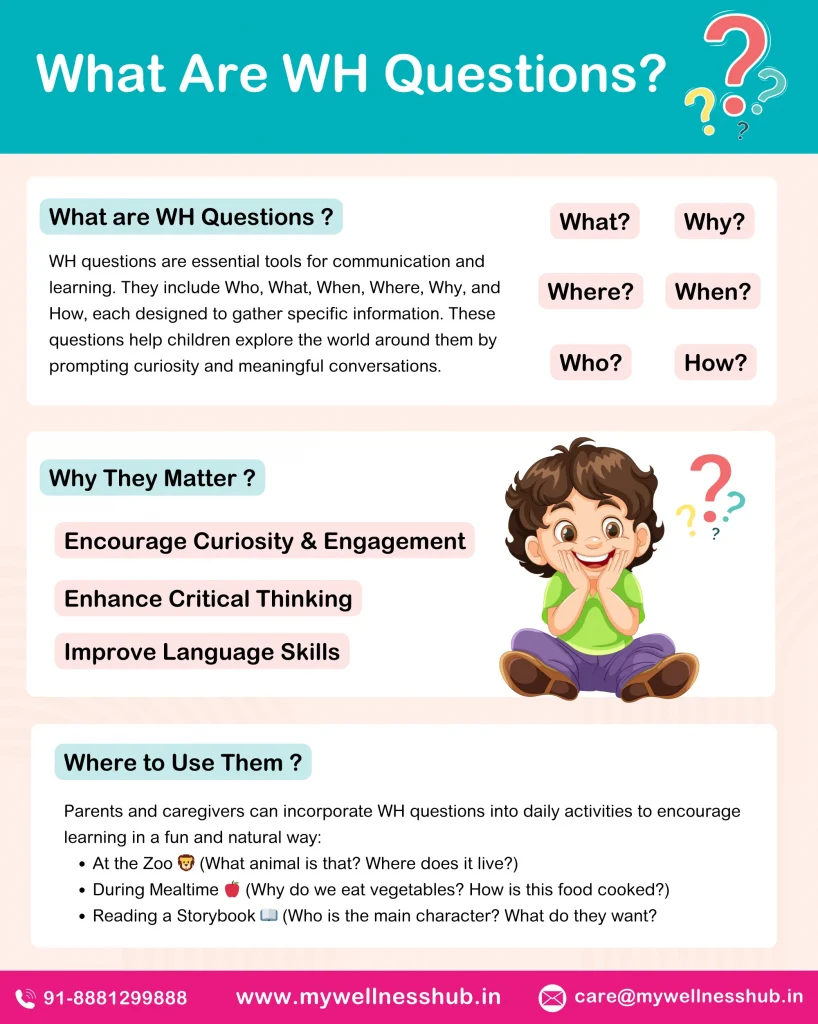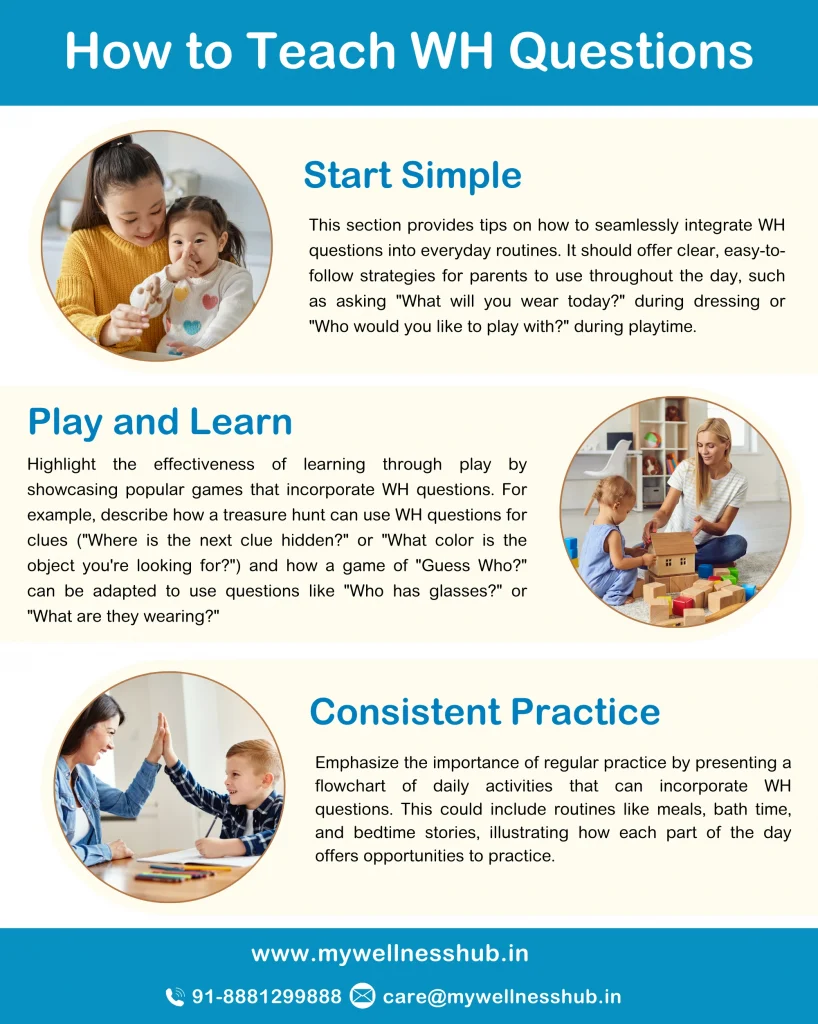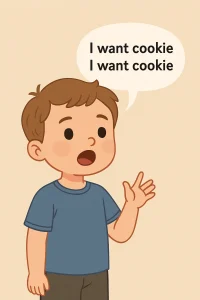WH Questions for 5-Year-Olds: Easy Ways to Help Them Learn
By Rajini D
Last Updated: February 12, 2025
Welcome, parents and educators! Wondering why WH questions are vital for your 5-year-old’s development? These simple questions—Who, What, When, Where, Why, and How—play a crucial role in enhancing cognitive and communication skills. They help children understand and interact with their world more effectively. At Wellness Hub, we provide engaging tools to make learning these important skills fun and interactive for 5-year-old. Let’s explore how introducing WH questions early on can set your child up for success in both learning and life!

What Are WH Questions?
Have you ever noticed how kids start asking questions as soon as they can talk? “Who is that?” “What are you doing?” “When are we going?” These are all examples of WH questions, and they’re a big part of how children learn about the world. WH questions include:
- Who — asks about a person.
- What — asks about a thing or an idea.
- When — asks about time.
- Where — asks about place.
- Why — asks for reasons or explanations.
- How — asks about the manner or process.
Why Teach WH Questions Early?
Introducing WH questions to children at a young age is like giving them a key to unlock the world of language and thought. But why start so early? Here’s why these simple questions can make a big difference:
1. Boosts Language Skills
- Understanding and Use: Early exposure to WH questions helps kids grasp the concept of questions and answers, improving their ability to communicate effectively.
- Vocabulary Growth: Each WH question prompts the use of specific language skills and introduces new words in context, helping expand a child’s vocabulary.
2. Enhances Cognitive Development
- Critical Thinking: Asking ‘Why’ and ‘How’ fosters a deeper understanding and curiosity about how things work.
- Problem Solving: By answering WH questions, children learn to gather information and assess situations, which are key skills in decision-making.
3. Improves Social Interaction
- Engaging Conversations: Knowing how to ask and answer questions makes interactions with others more meaningful and engaging.
- Empathy and Understanding: Questions like “Who” and “How are you feeling?” help children learn about perspectives and emotions, building empathy.
Also read: WH Questions for 3-Year-Olds | Boost Speech & Thinking Skills
How to Teach WH Questions to Young Children
Teaching WH questions to young children can be a fun and rewarding experience. Here’s how you can start simple and use everyday opportunities to introduce these critical skills:

Start Simple
- Incorporate into Daily Routines: Use mealtime, playtime, or any regular activity as an opportunity to ask questions like “What are you eating?” or “Where do you want to play?” This repetition in familiar contexts helps children grasp meanings naturally.
- Be a Role Model: Regularly use WH questions yourself. For instance, say, “What should I wear today?” while dressing or “Where did I put my keys?” when you are looking for something. This shows children how these questions fit into everyday conversation.
Tips on Using WH Questions in Everyday Chat
- Encourage Curiosity: Whenever your child shows interest in something, help them formulate a question about it. For example, if they point at a bird, you could ask, “What do you think that bird is doing?”
- Pause for Answers: After asking a question, give your child time to think and respond. This pause encourages them to process the question and formulate their thoughts.
- Expand Answers: When your child answers a question, expand on their response with additional information or follow-up with another WH question to deepen the conversation.
Also read: WH Questions for Kids with Autism: A Parent-Friendly Guide
Tools and Toys
- Wellness Hub’s Learning Tools: Introduce children to Wellness Hub’s range of interactive games and flashcards designed to teach and reinforce WH questions. These tools are crafted to make learning engaging and fun, turning a complex skill into an enjoyable activity.
- Interactive Books: Use storybooks that prompt readers to ask questions about the characters and plot. This not only improves understanding but also keeps the child engaged.
Using Wellness Hub’s Games and Cards
- Games that Prompt Questions: Wellness Hub offers games where children need to ask questions to move forward or solve puzzles. This practical application helps cement their understanding and use of WH questions.
- Flashcards for Daily Practice: Incorporate flashcards with WH questions into regular playtime. These can feature scenarios or pictures that prompt children to ask or answer questions, making practice a regular part of play.
Fun Activities to Practice WH Questions
Engaging young minds with WH questions doesn’t have to be a chore. Here are some delightful activities that turn learning into play, making sure your child enjoys every step of their educational journey.
Play Games
Games are a fantastic way to teach children the art of asking questions. Here are a couple of games that can help:
- WH Question Treasure Hunt: Create a treasure hunt where each clue involves answering or asking a WH question. For example, “Where do you find milk?” The answer leads them to the fridge, where the next clue is hidden.
- Guess Who?: Play a modified version of the classic “Guess Who?” game. Instead of yes/no questions, encourage your child to use WH questions like “What color are their eyes?” or “Where do they work?” This helps in understanding how to use each type of WH question in real contexts.
Tell Stories
Storytelling is an age-old method of imparting knowledge and skills. Use it to instill a curiosity for WH questions:
- Interactive Story Time: As you read a story to your child, pause and ask WH questions about the plot and characters. For example, “Why do you think the character went to the forest?” or “What do you think will happen next?” Encourage your child to ask their own questions about the story.
- Create a Story Together: Start a story and ask your child to contribute by answering WH questions. For instance, say “Once upon a time, there was a little dragon. Where did the dragon live?” Let your child answer and then build on the story from there.
Examples of WH Questions to Use
Here’s a simple list of WH questions tailored for 5-year-olds, with examples to integrate into everyday scenarios:
- Who: “Who is your favorite superhero?” Use during playtime or while reading their favorite books.
- What: “What are we having for dinner?” Involve them in meal planning or while cooking together.
- When: “When do we go to the park?” Discuss daily routines or upcoming events.
- Where: “Where did you put your toys?” Encourage them to think about organization and memory.
- Why: “Why do we wear coats outside?” Talk about seasons and weather conditions.
- How: “How do you tie your shoes?” Focus on explaining processes or solving problems.
Conclusion
Teaching WH questions is key to your child’s growth—it boosts their speaking, thinking, and understanding. These simple questions open a world of curiosity and knowledge, helping kids interact better every day. At Wellness Hub, we provide fun, engaging tools to make this learning journey enjoyable. Remember, every question is a chance to learn and grow. Keep encouraging your child, and together, let’s unlock their full potential! For more resources and tips, visit our learning tools page. Let’s nurture their curiosity and watch them thrive!
Frequently Asked Questions:
1. What are WH questions for kids?
WH questions include “Who,” “What,” “When,” “Where,” “Why,” and “How.” They are essential for helping children understand and interact with their environment, boosting their ability to communicate effectively.
2. Why is it important to teach WH questions early?
Introducing WH questions early enhances children’s language skills, critical thinking, and social interactions. Early mastery leads to improved academic performance and better personal expression.
3. How can I start teaching WH questions to my 5-year-old?
Begin by integrating WH questions into daily conversations and routines, such as during meals or playtime. Use simple, contextually relevant questions to make learning natural and engaging.
4. What are some fun games to teach WH questions to children?
Games like “WH Question Treasure Hunt” or “Guess Who” with a twist encourage children to use WH questions in a playful context. These games make learning interactive and enjoyable.
5. Can WH questions improve my child’s vocabulary?
Yes, practicing WH questions regularly helps children learn new words and concepts, expanding their vocabulary and improving their ability to form complex sentences.
6. How do I know if my child is struggling with WH questions?
Signs of struggle include hesitation to answer, irrelevant responses, or repeating the question. These behaviors suggest difficulties in understanding or using WH questions.
7. What should I do if my child doesn’t understand WH questions?
Simplify questions, use visual aids, and practice consistently. Ensure questions are clear and provide examples to help your child grasp the concepts involved.
8. Are there any specific tools from Wellness Hub to help with WH questions?
Wellness Hub offers educational tools like interactive games and flashcards specifically designed to teach and practice WH questions, making learning fun and effective.
9. How often should I practice WH questions with my child?
Daily practice integrated into various day-to-day activities is recommended. This consistent exposure helps children naturally absorb and use WH questions.
10. What are the benefits of mastering WH questions for young children?
Mastering WH questions supports better understanding and communication, enhances problem-solving abilities, and prepares children for more complex learning tasks in school.
About the Author:
Rajini Darugupally
M.Sc., Speech-Language Pathologist (9+ years of experience)
Rajini is a passionate and dedicated Speech-Language Pathologist with over 9+ years of experience, specializing in both developmental speech and language disorders in children and rehabilitation in adults. Driven by a desire to empower each individual to find their voice, Rajini brings a wealth of experience and a warm, genuine approach to therapy. Currently, at Wellness Hub, she thrives in a team environment that values innovation, compassion, and achieving results for their clients.
Book your Free Consultation Today
Parent/Caregiver Info:
Client’s Details:
* Error Message








